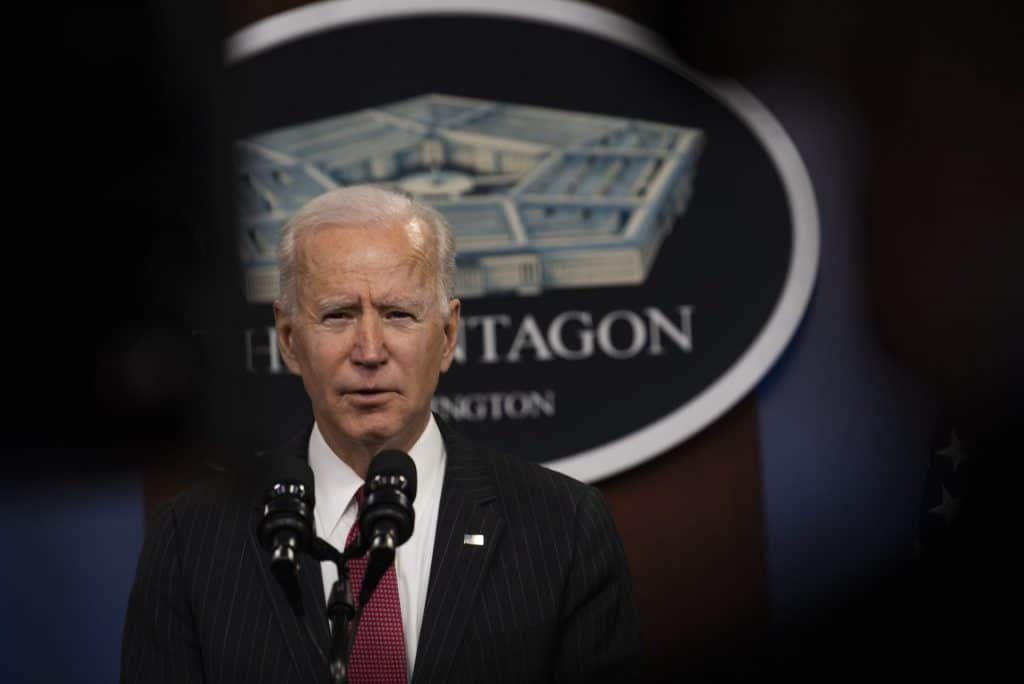The new US nuclear posture review is a major step backward
By Lisbeth Gronlund | November 4, 2022
 President Joe Biden delivers remarks to Department of Defense personnel at the Pentagon on February 10, 2021. (DoD/Lisa Ferdinando)
President Joe Biden delivers remarks to Department of Defense personnel at the Pentagon on February 10, 2021. (DoD/Lisa Ferdinando)
The US Defense Department finally released the 2022 Nuclear Posture Review (NPR) last Thursday (October 27). It reveals a shocking naïveté about how the real world works by ignoring two basic defense principles: the “security dilemma” and the “fallacy of the last move.” For example, the NPR describes US nuclear modernization plans as a necessary response to Russia’s and China’s activities and ignores the logical and inevitable response of both countries to US plans. By building new military capabilities to try to increase US security, Russia and China will likely feel threatened and respond by taking steps that will undermine US security. No one can have the last move. And on it goes.
A wise defense planner would consider the likely response of its adversaries—and seek to not undermine their nuclear security as well—for the hard-nosed reason that doing so is in the security interest of the United States.
Moreover, the NPR’s statement that there is an “urgent need to sustain and strengthen deterrence” is absurd, as if deterrence was some type of delicate flower that needed constant care and feeding to stay alive. The notion that the willingness of any country to launch nuclear weapons at the United States or its allies would depend on any specific aspect of the US arsenal is equally absurd.
In addition to these broader issues, the NPR includes several important revelations.
Using nuclear weapons. First, the good news. Obama’s 2010 NPR declared “the US will not use or threaten to use nuclear weapons against non-nuclear weapons states that are party to the NPT and are in compliance with their non-proliferation obligations.” (This declaration holds in the face of conventional, chemical, or biological attacks.)
For the remaining four nations—China, Iran, North Korea, and Russia—the United States reserved the option to use nuclear weapons in response to non-nuclear attacks, but only “in extreme circumstances to defend the vital interests of the United States or its allies and partners in a narrow range of contingencies.”
Both the Trump and Biden NPRs repeat these declarations word-for-word. It appears that Obama’s policy has become firmly embedded in US nuclear policy.
Reducing the hedge. Second, some other (maybe) good news. The new NPR states: “Hedging against an uncertain future is no longer a stated role for nuclear weapons.”
The United States has long maintained a stockpile of stored weapons roughly equal in size to the deployed arsenal for two reasons: to replace one type of weapon with another type should an unexpected technical problem arise, and to allow a rapid increase in deployed weapons by adding more warheads to US missiles, which can accommodate far more weapons than are deployed. No US administration has taken either of these steps.
This statement seems to make good on the pledge in Obama’s NPR which stated that “By modernizing our aging nuclear weapons-supporting facilities and investing in human capital, we can substantially reduce the number of stockpiled nuclear weapons we retain as a hedge against technical or geopolitical surprise.” Over the past decade, the United States has made those investments and should now be able to essentially eliminate the roughly 2,000 weapons in its hedge stockpile.
Yet, the statement has odd and unclear wording. Does it mean the Pentagon will continue to hedge, but not state it publicly? Is this indicative of Pentagon foot-dragging—in which case it won’t happen without the insistence of Biden and future presidents and a Congressional requirement with corresponding budget constraints? Biden did not insist on a sole authority policy, so it is unlikely he will insist on reducing the hedge.
Now for the bad news.
Reliance on nuclear weapons and a “sole purpose” policy. The NPR takes a substantial step back from Obama’s objective of “reducing the role of nuclear weapons in US security strategy.”
In contrast, Biden’s NPR states that the United States is “taking steps to advance the goal of reducing reliance on nuclear weapons.” Moreover, moving in this direction will require that several (quite substantial) “security, political and technology conditions evolve in ways that allow [the United States] to do so.” Clearly, reducing reliance is no longer on the Pentagon’s agenda. (Ironically, the NPR states that Russia and China “have demonstrated little interest in reducing their reliance on nuclear weapons.”)
An essential element of reducing reliance on nuclear weapons is a “sole purpose” policy in which the only purpose of US nuclear weapons is to deter the use of such weapons against itself and its allies and partners and, if necessary, respond.
Obama’s NPR stated the US goal was to adopt a sole-purpose policy and, during the 2021 presidential campaign, Biden pledged he would adopt do so if elected. However, his NPR does not include this policy and, far worse, it rejects a sole-purpose policy now and far into the future, stating that it “would result in an unacceptable level of risk” and that “for the foreseeable future US nuclear weapons will continue to provide unique deterrence effects.” These “unique deterrence effects” refer to the belief that nuclear weapons are uniquely capable of deterring and responding to some non-nuclear threats.
Arms control with Russia and China. Biden’s NPR states that the United States is committed to putting “diplomacy first” and is placing renewed emphasis on arms control. At the top of the list is a follow-on to the New START agreement, which expires in 2026. However, when the agreement was extended in 2021, Russia made clear that it would not make further cuts in its strategic arsenal unless the United States accepted constraints on its missile defenses. China certainly has similar concerns. Until the United States is willing to limit its defenses against long-range missiles, nuclear arms control will be at a dead end.
This was the logic underlying the 1972 Anti-Ballistic Missile (ABM) Treaty that strictly limited US and Soviet defenses against long-range missiles: Without such limits, both countries would simply build more weapons to overwhelm these defenses. The United States withdrew from the treaty in 2002 and now the chickens have come home to roost. The increased capacity of the Aegis sea-based missile defense system could result in a significant expansion of US defenses against long-range missiles—a clear concern to Russia and China.
New nuclear weapon types. The new NPR has completely abandoned Obama’s nominal pledge “to not develop new nuclear weapons.” Unfortunately, Obama’s NPR left a large loophole—that the weapons labs exploited. Nuclear weapon designers began working on new designs, arguing their new supercomputers allow them to do so without the need for explosive testing.
The original purpose of these supercomputers was to allow US weapons laboratories to better maintain the warheads in the current arsenal after the United States stopped nuclear explosive testing in 1992 in preparation for negotiations on the Comprehensive Test Ban Treaty (CTBT). (The United States signed the CTBT in 1996 although it has yet to ratify it.) US plans to design and build new nuclear weapons completely undermine the explicit purpose of the CTBT to prevent such “vertical proliferation.” Moreover, even if the weapons laboratories are confident in these new designs, it opens the door to future calls for renewed explosive testing which would be an international disaster, and almost certainly lead to the resumption of testing by other nations.
Yet, Biden has doubled down on new weapons.
The NPR calls for reestablishing the capabilities and infrastructure to return to full-scope nuclear weapons production, which will allow “regular and timely incorporation of advanced technologies to improve safety, security and reliability.” In other words, new warheads will be designed, produced, and dismantled on a regular cycle. This is a return to the Cold War practice of continuously building new types of warheads.
This NPR is a repudiation of Obama’s pledge to “seek the peace and security of a world without nuclear weapons.” It is shocking that President Biden signed off on this document.
Together, we make the world safer.
The Bulletin elevates expert voices above the noise. But as an independent nonprofit organization, our operations depend on the support of readers like you. Help us continue to deliver quality journalism that holds leaders accountable. Your support of our work at any level is important. In return, we promise our coverage will be understandable, influential, vigilant, solution-oriented, and fair-minded. Together we can make a difference.















